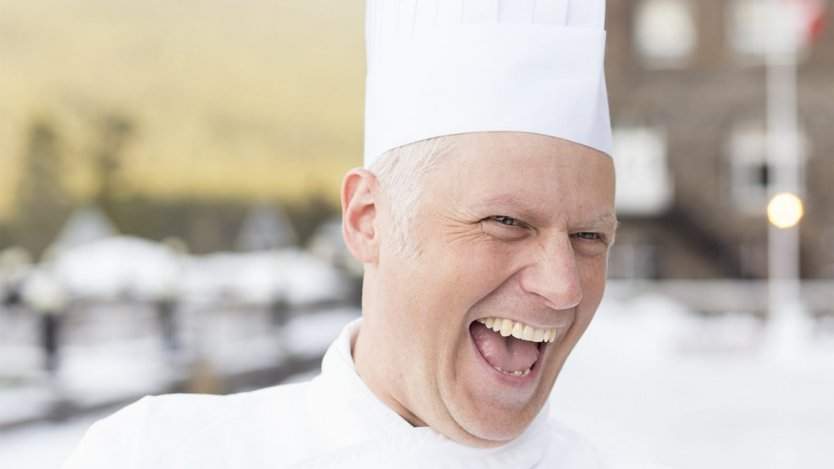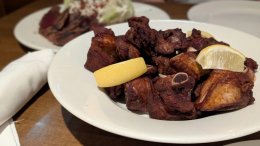Named for the first letters of his father's and grandfather's surnames, jW Foster started cooking years ago in Ontario. After spending time in a variety of restaurants across lake country, he found himself looking for a challenge. He found that challenge at the Fairmont Royal York, a hotel with one of the largest kitchens in North America (bet you didn't know that, did you?). Since working there in the early 2000s, Foster has been all over the globe with Fairmont. Today, you can find him running the kitchen at Fairmont Banff Springs, a castle-like property nestled cozily into the mountains just outside of Banff, Alberta.
After touring me through the hotel kitchens and concepts (there's everything from a sushi restaurant to a chophouse on the various floors and surrounding grounds), Foster took some time to talk about everything, from the importance of training young chefs properly to why some independent restaurants chefs can be much too quick to discount the role of a hotel chef in the culinary scene, plus, what it's like experiencing the "Anthony Bourdain effect" firsthand.
You've bounced all around the world with Fairmont: Toronto, San Francisco, Shanghai. How did you wind up in the Rocky Mountains?
A chance to run the kitchen here in Banff came up once the executive chef retired after almost 40 years.
Forty years? That's a ridiculously long time. Was it tenure? Could he not be fired?
Ha, ha, ha. No, no! He was an icon of this hotel for many, many years and still is. It was a very Swiss-driven cuisine while he was here. It was a little different than where we’re going with things now, as you can see with our charcuterie and wine bar, Grapes or 1888.
Most food-obsessed people (in the industry or not) have an unabashed love for Anthony Bourdain. You're the only chef I've ever met who has actually experienced what I would call the "Bourdain effect" (where any restaurant he mentions become an instant hotspot) firsthand while you were working in San Francisco. What was that like?
With the stature and following that he has, it was really astounding. If you follow along with what he’s done, you can tell he likes those tiki-style bars and it worked out really well. He fell in love with The Tonga Room, tweeted quite a bit about it and the followers came in droves. It’s almost like it brought Tonga back to life. Don’t get me wrong, that place will always be an icon, but all of sudden, it was like he made everyone wake up and realize they hadn’t been in awhile and he brought them all back. After that, we were doing 600 to 700 covers a night in there. Chefs from around the city were calling me to ask if I could get them in.
I love The Tonga Room.
I mean, if you’ve been there, then you know how awesome it really is. To me, being a chef there, you would go downstairs and you were in a completely different world. It’s definitely that kind of place where you forget where you are. I have a soft spot in my heart for Tonga. Every time I go back to San Francisco, I have to go in.
It's crazy to see those types of places on the rise again lately. Do you think Bourdain is partially responsible for that?
I don't know about that, but there definitely is a resurgence of them in North America; you’re right. I went to one recently in downtown Chicago, it was in this little alleyway, sort of a speakeasy. Once you walk in, there’s all of these fake skulls along a stairway and you walk into this really cool tiki-themed bar. It was great.
All of the moving parts in this massive kitchen at Fairmont Banff Springs is pretty astounding. What do you love about juggling it all?
It takes a lot of effort, but you have to look at the bigger picture. I can’t just look at it as running a big operation. All of the chefs that I generally hire [to lead the different concepts] are usually restaurant chefs because they have that attention to detail. It’s all about the ingredients, as it should be.
I’ve had more than a few menu items lately where the menu description or terms don’t match what’s delivered. Does that ever happen to you?
We really try to not do that here. If you look at a lot of restaurant menus now, sometimes, you’re lucky to get four words on a menu that describe a dish. It leaves a lot of leeway in terms of what can actually show up at the table. People talk about hotels and say, “Hotels are always so old school!” I don’t think there is really anything wrong with that because new school never came around until people truly understood the basics. It’s almost like we’ve gone so far [to one end of things] that we’ve forgotten where we’ve come from, where we originated. Don’t get me wrong, I believe in twisting things for the sake of creativity, but you have to stay somewhere within traditions instead of going all the way out in left field.
I think a lot of independent chefs are quick to write off hotel chefs as nothing more than sergeants of armies of cooks, pushing out plates of steamed vegetables, scoops of mashed potatoes and overcooked chicken. What are your thoughts on that frame of mind?
I don’t really get caught up in that kind of thing. I think it might be a lack of knowledge and one person not seeing what’s going on in another’s day-to-day. There is a stigma that needs to be broken. By going to great events like Brewery and The Beast, we break down that barrier to be like, “Hey, we are doing some great things too.”
What are some of those great things?
We’ve hooked up with a co-operative just outside of Calgary. All of our carrots come from one farmer, our eggs from another one. He raised a whole group of chickens just for us. We call them the “Fairmont hens” and they just produce for this hotel specifically. We’re raising meat chickens as well now. We’re working with Fairwinds cheese for a custom cheese for the hotel and I’m also bringing our apprentices out there to learn to make cheese. We do whole animal butchery here too: wild boar, beef, bison, you name it. All of that is so, so important to me as chef and that's what I teach all of my young chefs.
You've been to culinary school and the hotel has an extensive apprenticeship program Is a proper culinary education something that you personally encourage?
It’s huge to me. Huge. I encourage all of the apprentices to take their Red Seal exams too. If you want to travel, you need these things because, you have to have these certifications to be able to work in different countries, and every year, it gets harder for people to work abroad. What we try to offer them here is variety. It’s a three-year apprenticeship program to work in 13 different food concepts, learn how to butcher whole animals, learn to make proper charcuterie, and cheeses. They learn all of these things before they’re done; plus; they have their schooling.
When they’re finally all done? Well, to me, that’s a [culinary] Ferrari right there. Now they’ve got the keys and can go take it for a spin and see what cooking can really do for them!
It's great to a lot of female chefs in the kitchen here.
Yes, especially our head chef at The Waldhaus, Kristine Pawlowsky. She’s amazing. I grew up in that [men only] kitchen culture and it doesn’t even make any sense. Chef Dana Hauser is a perfect example of being a talented individual and executive chef and I think we are going to see more and more of that in the future. Dana has actually just left Vancouver and went down to San Diego to run the kitchen at the Fairmont property there. Very cool!
Karine Moulin has moved down to California too. We're losing all of our great Canadian female chefs to California!
Ha! Well, that sort of sounds like it, doesn't it? Karine Moulin, she’s fantastic too. She came up to Banff to do an event with us a couple of years ago and I remember trying to convince her to come work here!
Where do you travel when you need some culinary inspiration?
I take a lot of trips to New York, Chicago, San Francisco, and Vancouver. Travelling is hugely important, but it’s not just about what ends up on your table. I go to Italy, where I’ve done cooking classes, but I don’t even mention I’m a chef. It’s nice to see people [in their perspective regions] who truly love their cuisine and really know the basics. It’s essential to staying sharp. Knowing cuisines and trends is just as important as knowing how to use the knife that’s in your hand.













